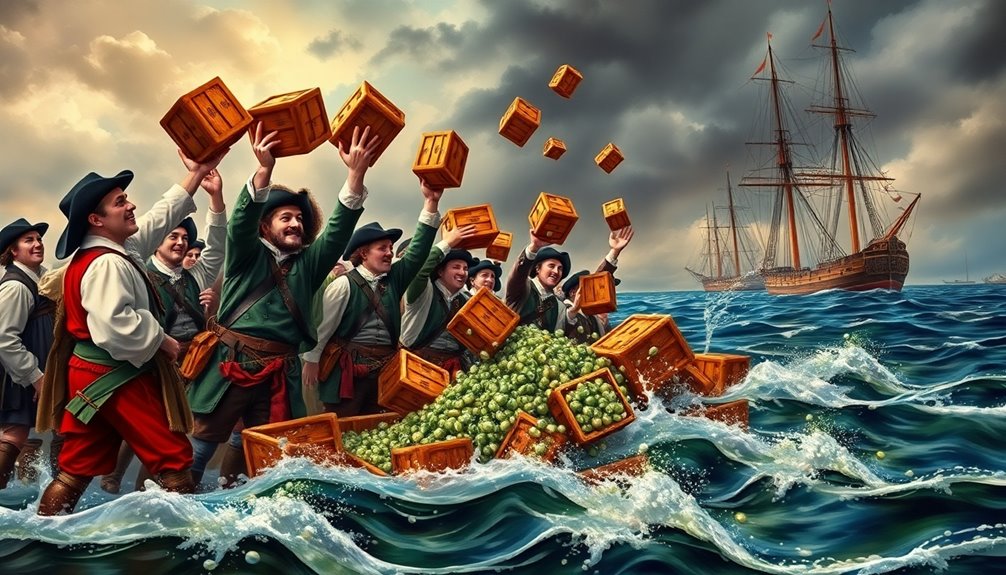The Boston Tea Party on December 16, 1773, was a bold act of rebellion by about 60 colonists. Disguised as Mohawk Indians, they tossed over 342 chests of tea into Boston Harbor. This protest was in response to the unfair Tea Act, which favored the British East India Company and imposed a tax on tea, upsetting many colonists. The event sent a powerful message against British control and highlighted the growing frustration with taxation without representation. By standing together, colonists sparked a movement toward independence. If you're curious about what happened next, you'll want to stick around!
Key Takeaways
- The Boston Tea Party on December 16, 1773, was a protest against British taxation and monopoly on tea sales.
- Colonists dumped over 342 chests of tea into Boston Harbor, symbolizing resistance to British oppression.
- The Tea Act of 1773 sparked outrage as it granted the British East India Company exclusive control over tea, heightening colonial unrest.
- The event united colonists, highlighting the broader issue of taxation without representation and fostering a sense of American identity.
- The Boston Tea Party led to the Coercive Acts, further galvanizing colonial opposition and setting the stage for the American Revolution.
Introduction

The Boston Tea Party, often regarded as a pivotal moment in American history, took place on December 16, 1773, in Boston Harbor. This protest was a direct response to the Tea Act, which gave the British East India Company control over tea sales in the American colonies.
Frustrated by taxation without representation, about 60 American colonists disguised themselves as Mohawk Indians and participated in this bold act. They dumped over 342 chests of tea, worth around £10,000 (that's about $1 million today!) into the harbor.
Governor Thomas Hutchinson's refusal to let the tea ships return to England only fueled the anger of the colonists. The Boston Tea Party wasn't just about tea; it represented a significant act of defiance against British control and showcased colonial unity in the face of oppression.
The event sparked a chain reaction that led to the British Parliament passing the Intolerable Acts in 1774, which increased tensions between the colonies and Britain. This growing unrest ultimately contributed to the start of the American Revolution.
The Boston Tea Party became a symbol of resistance and unity among the American colonists, paving the way for their fight for independence.
Tea's Role in Colonial Unrest

Tea played a crucial role in escalating colonial unrest in the years leading up to the American Revolution. The British East India Company gained a monopoly on tea sales in the American colonies through the Tea Act of 1773. This act allowed the company to sell tea directly to you at lower prices, but it also meant colonial merchants were threatened.
The tea tax, a three-pence charge per pound from the Townshend Acts, remained. You and your fellow colonists saw this as an unfair way for the British Parliament to tax you without representation.
As resentment grew, organized protests emerged. Cities like New York and Philadelphia saw merchants refuse British tea shipments, showcasing widespread discontent.
The Boston Tea Party on December 16, 1773, was a key moment. About 60 colonists, disguised as Mohawk Indians, dumped 342 chests of tea into Boston Harbor. This protest directly challenged the East India Company's monopoly and the tea tax.
Samuel Adams and others encouraged this resistance, emphasizing that you deserved fair treatment. These events fueled the fire of rebellion, uniting colonists against what they viewed as British injustices.
Tea, once a simple drink, became a powerful symbol of dissent!
Colonial Resistance to Taxation

Growing frustration over British taxation without representation sparked a wave of colonial resistance in the late 1760s and early 1770s. When the Stamp Act of 1765 and the Townshend Acts of 1767 imposed taxes on everyday goods like tea, colonists felt their rights were being ignored.
The Tea Act of 1773 made things worse by giving the British East India Company a monopoly on tea sales. While the tea was cheaper, the tax remained, and you can imagine how angry that made the colonists!
In response, groups like the Sons of Liberty formed to fight back. They organized protests and even prevented British ships from unloading taxed tea in ports, especially in Boston.
The situation escalated when British soldiers killed five colonists during the Boston Massacre in 1770. This tragic event fueled even more anti-British emotions.
On December 16, 1773, the anger boiled over during the Boston Tea Party. Colonists, dressed as Native Americans, dumped tons of British tea into Boston Harbor.
This bold act of defiance against British taxation sent a clear message: colonists would no longer accept taxation without representation!
Tea's Symbolic Resistance Power

Although many viewed the Boston Tea Party as a simple act of vandalism, it actually embodied a powerful message of resistance against British oppression. This event, which took place on December 16, 1773, involved about 60 colonists who disguised themselves as Mohawk Indians. They boarded ships and dumped 342 chests of tea into Boston Harbor to protest against British taxation without representation.
This bold act symbolized a united front against the British East India Company's monopoly and the unfair Tea Act of 1773.
It wasn't just about tea; it represented broader issues of colonial rights and the desire for self-governance. The Boston Tea Party highlighted the growing frustration over British economic control and sparked a sense of American identity.
Taxation Without Representation Debate

The debate over "taxation without representation" ignited a firestorm of dissent among American colonists, who felt their rights were being trampled by distant lawmakers.
They believed it was unfair for the British Parliament to tax them without giving them a voice through elected representatives. The Stamp Act of 1765 and the Townshend Acts of 1767 added fuel to the fire, as these laws taxed essential goods and printed materials.
When the Tea Act of 1773 allowed the British East India Company to sell tea directly to the colonies while keeping the tea tax from the Townshend Acts, it became a symbol of their struggle.
American colonists organized protests, declaring that they wouldn't pay taxes imposed by a government that didn't represent them. This tension culminated in the Boston Tea Party, where colonists dumped tea into Boston Harbor in defiance of British rule.
The aftermath saw the Coercive Acts, also known as the Intolerable Acts, imposed to restore order.
Instead, these acts united the colonies against what they viewed as tyranny, igniting a revolutionary spark that would change history forever.
Practical Applications

Recognizing the impact of the Boston Tea Party extends beyond its historical significance; it offers valuable lessons in civic engagement and collective action.
When you think about the Boston Tea Party, remember that it was a bold protest against the East India Company's monopoly on tea and taxation without representation. The American colonists showed incredible defiance by dumping 342 chests of tea into Boston Harbor. This act not only challenged the British Parliament but also inspired future movements for justice. In the modern context, this kind of activism can be likened to the role of ethical hacking in identifying vulnerabilities in systems and advocating for change. Furthermore, the concept of design thinking can enhance collaborative efforts by encouraging diverse perspectives in problem-solving.
What can you take from this? First, understand the power of collective action. When people unite for a common cause, they can make a significant impact.
Second, remember that protests can lead to change, even if they face backlash—like the Intolerable Acts that followed.
You can engage in civic activities today by joining community discussions, signing petitions, or even organizing local events to voice your opinions. Every small action counts! Additionally, recognizing the importance of trust and boundaries in your activism can help foster more sustainable and respectful relationships within your community.
Frequently Asked Questions
What Sparked the Boston Tea Party?
You'll find the Boston Tea Party was sparked by growing resentment over unfair taxes and monopolies imposed by Britain. Colonists felt betrayed, leading them to take bold action against the tea shipments that symbolized oppression.
What Was the Boston Tea Party Revolution?
The Boston Tea Party was a bold protest where you and fellow colonists dumped British tea into the harbor, rejecting unfair taxation. This act of defiance united the colonies and escalated tensions with Britain, leading to revolution.
How Did the Tea Act Lead to the American Revolution?
The Tea Act angered you and other colonists by enforcing a tax while allowing a monopoly. This violation of rights sparked protests, uniting you against British control and ultimately leading to the American Revolution.
How Did the Boston Tea Party Lead to the American Revolution Quizlet?
You'll see that the Boston Tea Party galvanized colonial unity against British oppression. It sparked outrage, leading to retaliatory laws and ultimately pushing the colonies towards organized rebellion, setting the stage for the American Revolution.
Conclusion
In conclusion, the Boston Tea Party wasn't just about tea; it was about standing up for what's right! Colonists united against unfair taxes, showing that even a cup of tea could spark a revolution. So, next time you sip your favorite drink, remember the brave actions of those early Americans. They fought for their rights, and their story inspires us to speak up today. Let's keep their spirit alive by always standing up for fairness!










